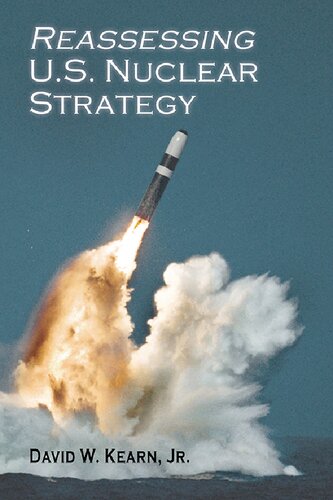

Most ebook files are in PDF format, so you can easily read them using various software such as Foxit Reader or directly on the Google Chrome browser.
Some ebook files are released by publishers in other formats such as .awz, .mobi, .epub, .fb2, etc. You may need to install specific software to read these formats on mobile/PC, such as Calibre.
Please read the tutorial at this link: https://ebookbell.com/faq
We offer FREE conversion to the popular formats you request; however, this may take some time. Therefore, right after payment, please email us, and we will try to provide the service as quickly as possible.
For some exceptional file formats or broken links (if any), please refrain from opening any disputes. Instead, email us first, and we will try to assist within a maximum of 6 hours.
EbookBell Team

4.7
36 reviews*This book is in the Rapid Communications in Conflict and Security (RCCS) Series (General Editor: Geoffrey R.H. Burn).
The United States is currently in the early stages of modernizing its entire nuclear enterprise. The Obama administration, established a program to replace all three legs of the strategic triad over the next three decades: long-range bombers, land-based intercontinental ballistic missiles, and nuclear-powered ballistic missile submarines, as well as the upgrade of an existing gravity bomb and a replacement for the air-launched cruise missile. Nuclear command, control and communications systems and the nuclear weapons laboratory complex and infrastructure are also included in the program. It is estimated that the full strategic modernization program will cost as much as $1.2 trillion over thirty years. The Trump administration largely endorsed this plan, with two additional refinements—the retrofitting of a portion of submarine-launched ballistic missiles with lower-yield warheads and the development of a sea-launched cruise missile—to better address challenges of renewed great power competition.
This book reassesses the nuclear strategy of the United States. Despite the appearance of continuity in official policy statements, views within the Obama and Trump administrations and across the larger defense policy community have diverged on the appropriate role of nuclear weapons in U.S. national security, the optimal nuclear strategy for advancing U.S. interests, force structure requirements, and critical related issues.
This study seeks to answer a vitally important question: what type of strategic arsenal—in terms of quantitative force levels and types of deployed weapons—is necessary to deter adversaries, assurance allies, maintain strategic stability, and support strategic arms control and nonproliferation objectives? Moreover, given the nature of technological change, what strategy will effectively serve to hedge against geopolitical risk while also allowing for investment in the research, development, and acquisition of cutting-edge military applications derived from new and emerging technologies? The United States is now at a critical juncture; it must seek to develop an optimal nuclear strategy allows for conventional forces modernization and balances investments in current versus future capabilities. To outline an optimal nuclear strategy, this study develops and assesses three ideal type nuclear strategies for the United States and critically analyzes them in the context of geopolitical, technological, proliferation, and budgetary trends, building upon the works of both academic scholars and policy analysts.
Reassessing U.S. Nuclear Strategy is an important book for security and strategic studies and should be of interest to both scholars and practitioners in the field of nuclear weapons policy.